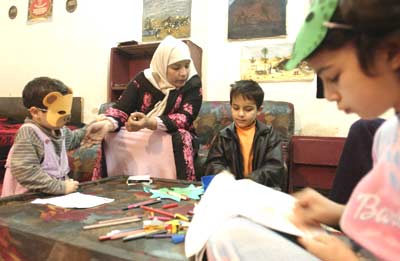|
Peace Team Details | Reports | Messages to
Preparing for war
Mary Foster
Baghdad, 8 February 2003.
 Here are some of the ways that people in Iraq are preparing for war.
Here are some of the ways that people in Iraq are preparing for war.
At our hotel, they are digging a well. Our friend Sattar's brother is also
digging a well. Once the electricity is bombed out of commission, water
treatment plants will cease to function. Bottled water, already expensive,
will become unaffordable. People hope that wells will provide a source of
drinkable water during the war.
Throughout the city, windows are being boarded up. Only a few so far. People
have taped them up with cardboard. This is to keep them from shattering in
the bomb blasts.
Since January, the government has been issuing double food rations. Sixty
percent of the population in Iraq is dependent on government rations. When
the war starts, the distribution programme will no longer function. As in
1991, food will become scarce and unaffordable by all but the very rich. The
government has been issuing double rations so that people can store it up
for the war. Our government minder Zayd has been able to store up food under
this programme. But poor people have had to sell it to make ends meet.
Archbishop Kassab, the head of the Catholic church in Basra, has been
preaching about courage. He hopes that it will help his people face the
coming war. He has also been trying to create links with Muslim leaders so
that the war does not open the door to inter-faith violence as it did in
1991.
Imam Abdul Amir of Basra's biggest church has been calling for solidarity
among Muslims to defend the country. He has been teaching his people to
approach the war with an attitude of faith in God. What God wills, even if
it is death, we must accept as God's will.
Yemeni students in Iraq have been giving blood. Some have also taken an oath
to defend Iraq from foreign invasion. They have been training.
Many of those who can are leaving the country. The passport office is very
busy these days. Jordan is not letting young men of military age into the
country, and is turning back many others. But the old man at the Al Monzer
Hotel in Amman has gotten through, and he is waiting in Amman to get a visa
to join his wife in Sweden. Ahmed wants to leave, but he can't. He has a
shop and doesn't feel he can leave it behind.
The international staff of NGOs are buying travel guides for Jordan. They
will soon be leaving Iraq.
Medecins sans frontiers is setting up an ambulance service. They are also
trying to get medical supplies to treat the war wounded and the hundreds of
thousands who are expected to fall prey to disease as clean water and basic
necessities become scarce. After a decade of sanctions, the medical system
in Iraq is very fragile. MSF is expecting a disaster.
Our friend Amal is trying to store up money. She is selling paintings,
giving computer lessons, and sewing clothes. Money is apparently one of the
handiest things to have in a war. She is also planning to leave the city.
She believes that the country will be safer than the city for her three
children, Adeer, Omar, and Ali.
Essam is still making plans. He hopes to have the first solo exhibit of his
paintings at the end of the month. He is not sure that it will happen.
The military reserves have been holding parades. Some of them are only 16
years old. They march along with the men, training for battle.
The Iraq Peace Team has brought in a satellite phone. When the communication
system breaks down, they want to be able to tell people in the outside world
what is happening in Iraq.
It was difficult to ask people what they were doing to prepare for war. We
often didn't. So these are just a few of the ways that people in Iraq are
preparing for the war.
|